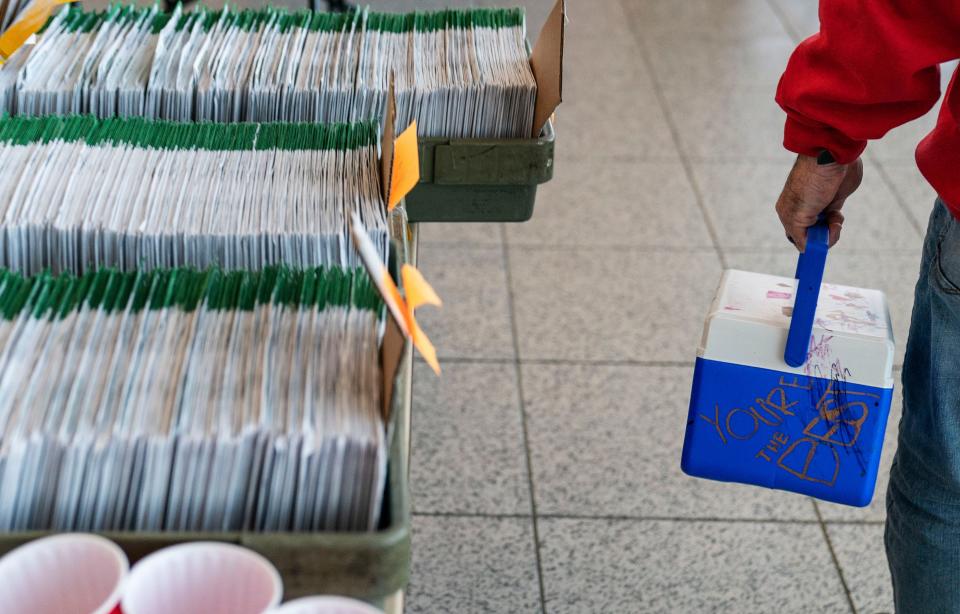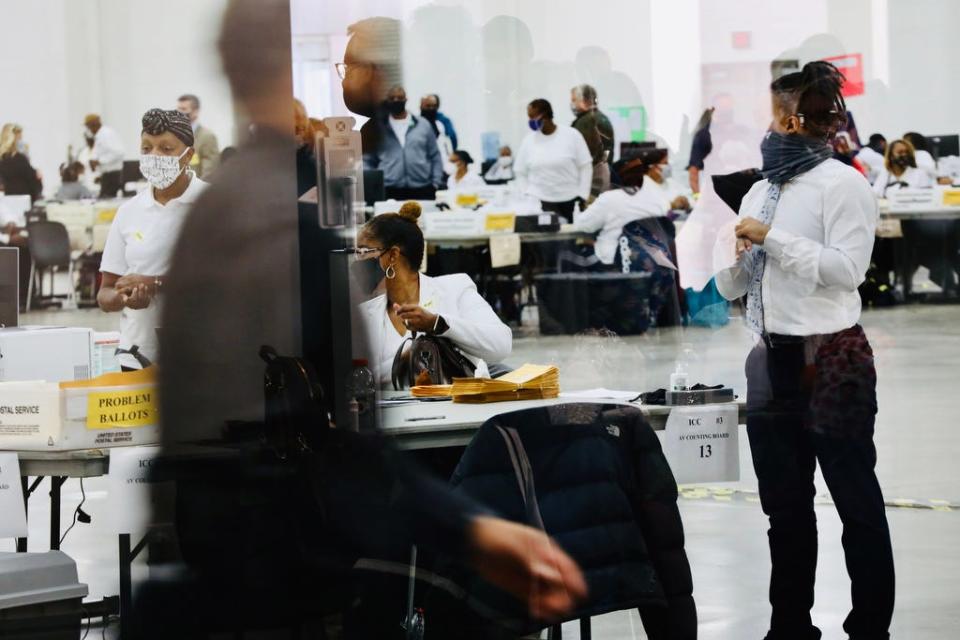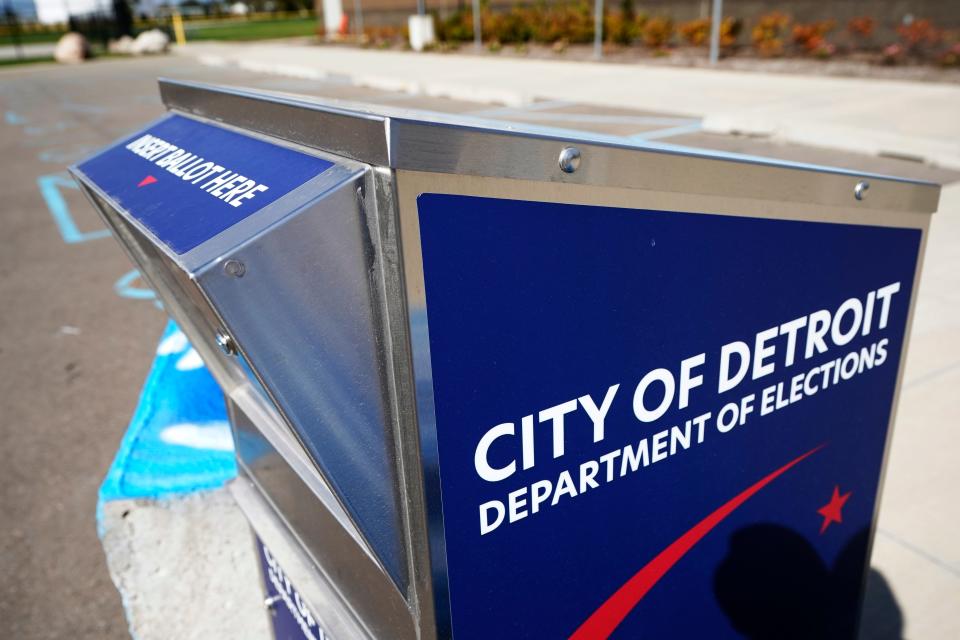Threats, FOIA floods and the long shadow of 2020: Michigan clerks and the new world of elections
- Oops!Something went wrong.Please try again later.
- Oops!Something went wrong.Please try again later.
- Oops!Something went wrong.Please try again later.
LANSING, Mich. — Tina Barton was shocked the first time she received a death threat over the phone a few days after the 2020 election.
As the city clerk in Rochester Hills, Michigan, Barton was responsible for ensuring the election there ran smoothly and securely, a job she thought she did well. But that didn’t stop conspiracy theorists — emboldened by former President Donald Trump’s unproven claims that the election had been stolen from him — from calling Barton and making death threats for what they falsely believed was her role in rigging the election.
“To do all the things that you’re supposed to do, only to have people say they're going to slice your throat in public, … it shakes you,” Barton, a Republican, said.
Barton’s story is not unique. But threats to their personal safety were just the beginning for election clerks in Michigan and across the country. Since Joe Biden won the 2020 presidential election, they have faced an onslaught of Freedom of Information Act requests, the influx of new election workers possibly armed with political agendas, and an increased need for more security-focused funding since 2020.
Taken together, the election officials say, the lingering effects of the 2020 election make running elections this year harder than ever.
Fact check: Joe Biden legally won presidential election, despite persistent contrary claims

Advocating for more resources
“I miss the time when it was unacceptable to make such threats and to harass people in such a manner,” said Barb Byrum, county clerk in Ingham County, home to the state capital of Lansing. “A lot of this is the result of people seeing what our leader was doing, and how he was acting, and they have been emboldened to act the same without any real accountability.”
Byrum said personal security now is always on her mind — something she didn’t think about before 2020. She and her Michigan colleagues have advocated for more resources dedicated specifically to ensuring elections workers feel safe at their jobs.
'Rig the system': GOP candidates for secretary of state run on Trump's election denial platform
In February, election clerks across the state published an open letter to legislators asking for “resources and policies to ensure a smooth 2022 election cycle.” Among the clerks’ asks included increased funding dedicated to security at polling and drop box locations and mandatory training classes for election challengers.
The following month, Secretary of State Jocelyn Benson granted local and county clerks $8 million to buy new locks and cameras and other security-related improvements before the midterms.
Benson’s office also recently proposed dedicating $100 million annually to bolster security around election administration and increasing the penalty for anyone who threatens or harasses election workers or publicly releases those workers' personal information without consent. Benson said her office has also set up meetings connecting election clerks with law enforcement to establish protocols and safety procedures on Election Day.

Midterms: Abortion rights face test in Kansas vote, the first of its kind since the fall of Roe
According to Benson’s office, the $100 million would be used to train election workers and upgrade the state’s election equipment, as well as provide election administrators with a more consistent flow of funds.That's a contrast to what she described as a “reliance on local and federal agencies [that] has resulted in unpredictable and unstable funding” for elections.
Separately, law enforcement has always been active on Election Day, but there’s been an increased focus on preparing for the day because of the increased threats that election workers have experienced since 2020. Benson’s involvement in connecting clerks with law enforcement is a result of those threats.
“The bottom line to me is that polling places should be a sanctuary of peace on Election Day, a place where you're proud and excited to go, not a place where you feel threatened or where threats may emerge,” Benson said.
In Delta Township, Mary Clark, who spoked to USA TODAY while she was still clerk, said grant funding from the state and the last of the funding provided by the 2002 Help America Vote Act is being used to ramp up security at polling stations. At her office, they're adding more cameras and keeping up plexiglass shields that were added during COVID.
“I want as much of those possible threats off of our shoulders so that we're focused on the integrity and accuracy of the election,” Clark said. “I don't want my staff worried about who might walk through the door.”
Midterms: A new 'Big Lie' battleground emerges in secretary of state elections
Recruitment efforts from the top down
Benson has faced her own share of threats and intimidation during her time as the state’s chief election officer.
In May, news broke that while in office, Trump suggested in a White House meeting she be tried for treason and executed because of her unwillingness to overturn election results in the state.
Across the country, the impact of the 2020 election is causing election workers to leave their posts in record numbers, according to the Brennan Center for Justice. In Michigan, the Republican party has led a concerted effort to enlist thousands of 2020 election deniers to fill those open posts and work as election inspectors in the coming midterm elections.
Clark, a Democrat who also serves as president of the Michigan Association of Municipal Clerks, said that new applicants to serve as election workers throughout the state are overwhelmingly from election-denying Republicans – likely at the direction of the Republican National Committee.
For example, the Detroit Free Press this year reported that the Michigan Republican Party is “engaged in a full-scale campaign to recruit Republicans to help administer elections this year.”
More: Surge in new GOP poll workers could be headed for Michigan’s big cities after 2020 chaos

“I’d say it's five to one,” Clark said of the ratio between Republican and Democratic applicants.
According to Clark, there are representatives from both the Democratic and Republican parties at every polling center on Election Day, and the training process they must go through is thorough.
In Plainfield Charter Township just outside of Grand Rapids, deputy clerk Tina Porzondek said she welcomes the new volunteers, regardless of their preconceived notions or motivations. The more people who are trained and educated about the process of election administration, the more those people will understand that the process in Michigan is secure, Porzondek said.
“If you have any doubt about the security of elections, the checks and balances that we have in place, I encourage you to get trained as an election inspector and work in election administration,” said Porzondek, who also serves as the director of membership at the Michigan Association of Municipal Clerks. “See for yourself.”
The lingering effects of 2020
In addition to security concerns and managing the influx of new volunteers, clerks nationwide have been flooded with FOIA requests from conspiracy theorists hoping to find confirmation for their false claims of election fraud.
“The flood of FOIA requests from election deniers is absolutely something we are hearing about all across the country, and especially in the swing states that have most been the subject of election conspiracies.” said Derek Tisler, an expert on election security at the Brennan Center for Justice.
“Election workers recognize that transparency and public accountability is an essential component of their jobs, but the number and scope of public records requests has demanded significant staff time and attention as they simultaneously prepare for elections this year,” Tisler said.
Washington news you missed in July: Biden gets COVID, Congress pushes inflation package
In Ingham County, Byrum said responding to the number of FOIA requests related to the 2020 election is costly and has zero chance of changing election results.
“They want copies of poll books and tabular tapes and all of that,” Byrum said. “Yes, we respect FOIA, but it's going to cost arguably thousands of dollars. We're going to have to open up bags, we're going to have to break seals…It's going to be an undertaking.”
Two hours away in Ottawa County, clerk Justin Roebuck, who also has been threatened, said his staff is spending roughly a quarter of their time dealing with FOIA requests and other issues related to the 2020 election.
“We have seen a dramatic increase in Freedom of Information Act requests,” said Roebuck, a Republican. “Here we are, more than 450 days out from 2020 and we're still spending that time, and that’s a resource. We have other elections to prepare for.”
This article originally appeared on USA TODAY: In Michigan, election clerks see threats, flood of FOIA requests

